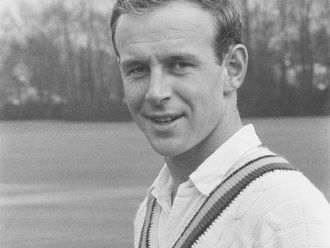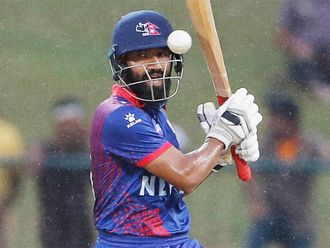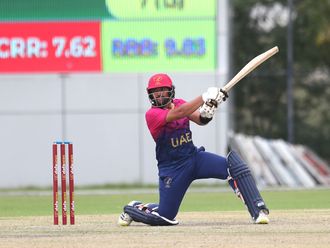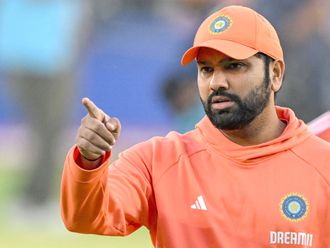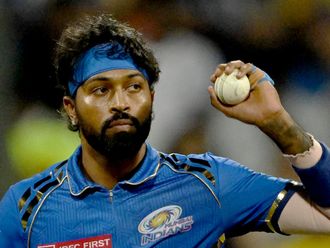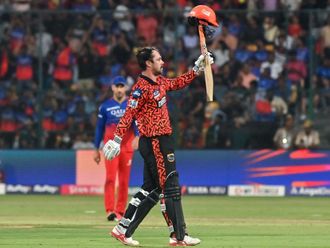Dubai: “It was the best of times, it was the worst of times, it was the age of wisdom, it was the age of foolishness, it was the epoch of belief, it was the epoch of incredulity... it was the spring of hope, it was the winter of despair...” – Charles Dickens, A Tale of Two Cities.
There is, perhaps, nothing Dickensian about one of India’s most venerable sporting venues turning 150. Nothing Dickensian, did we say? Well, you could be right and you could be wrong.
You could judge its legacy with the dead-pan seriousness of a statistician, or you could plumb the depths of nostalgia. You could hate it for indulging in a sports lover’s narcissistic obsession with all things ‘dear’ and ‘near’, or you could love it for the dollops of unconditional, unalloyed hours of pleasure.
For Kolkata’s Eden Gardens is one such venue whose timeless, iconic stature in the world of sport, particularly that of cricket, makes it stand out like a solo instrument whose mellifluous rendition has mesmerised generations into a time warp.
Established in 1864, during the heyday of the colonial era in the sub-continent, what probably gives Eden Gardens the edge over every other sporting venue in India is the fact that it has been the platform to showcase the nation’s best in two of its most popular sports — cricket and football — for more than a century.
Prestigious address
Home to the Cricket Association of Bengal (CAB), Eden Gardens hosted its first Test match in 1934 and until 1984 it was the most prestigious address for the best that Indian football had on offer — be it the Federation Cup, the Calcutta First Division League, the Indian Football Association Shield or the Nehru Cup.
The VIP enclosure hosted many a celebrity, including former prime minister Indira Gandhi, who was present at the inaugural match of the 1984 Nehru Cup. It was at this very ground, on October 18, 1990, that a public reception was organised to honour Nelson Mandela. As the soft, golden rays of the setting sun caressed the stadium, a visibly moved Madiba joined the nearly 100,000-strong gathering for an impromptu rendering of We Shall Overcome.
After 1984, with the emergence of the Salt Lake Stadium, the hallowed Eden Gardens was devoted exclusively to cricket.
During these 150 years, like a truly immersive Dickensian experience that revels in the dichotomies of life, the experience that is Eden Gardens has vacillated between such extremes and ignited such a varied platter of emotions that the end result has often been therapeutic on the mind of an average sports lover.
January 1, 1967: A braveheart Conrad Hunte climbs atop the burning stands to prevent the Caribbean flag from being engulfed by flames as irate spectators set the stands on fire.
August 16, 1980: 16 football fans die in a stampede during an East Bengal-Mohun Bagan derby clash.
February 28, 1982: A livewire called Enzo Francescoli has an 80,000-strong crowd in raptures as Uruguay edge past Italy 3-2 in the final of the Nehru Cup.
November 8, 1987: A gung-ho Mike Gatting of England goes for a needless reverse sweep to hand a rag-tag Australia their first World Cup.
March 13, 1996: A tearful Vinod Kambli of India goes back to the pavilion as crowd violence halts the World Cup semi-final against Sri Lanka. Match later awarded to the Lankans.
February 19, 1999: Sachin Tendulkar collides with Pakistan pacer Shoaib Akhtar before being adjudged run out. As Tendulkar departs, fans hold up play, hurling plastic bottles on to the arena, forcing the ‘Little Master’ to do a lap of the ground seeking calm.
March 15, 2001: Disbelief written all over Aussie skipper Steve Waugh’s face. After forcing Sourav Ganguly’s boys to swallow the bitter pill of a follow on, the invincible Aussies incredibly lost the match by 171 runs!
Each one of these incidents have acquired such folklorish proportions that it will be impossible to archive moments from this patch of green without referring to them at least once — signposts that will always bear testimony if there were to be a sporting equivalent to an Indian fan’s conceptual construct of a “calm of mind, all passion spent”.
Times have changed and so have the game and its followers. From the first India-England Test in 1934 to Indian Premier League (IPL) matches earlier this year, Eden Gardens has come a long way. But every time a bowler marks his run-up at the ‘High Court end’ or the ‘Club House end’ on the first morning of a Test match, the nip in the air is all too familiar.
The Tuxedo-Teflon and impeccably white dhoti-kurtas have made room for wrinkle-free chinos and baseball caps in the lower tier of B.C. Roy Club House. And IPL razzmatazz has turned the game on its head. But Eden continues to enthral with a near-Dickensian allusion to extremes of emotion that abound in its garden of sensory experiences.


